Nutrients are substances that organisms must consume or absorb for survival, growth, and maintaining overall health. They are essential for carrying out vital bodily functions, such as providing energy, supporting growth and development, and maintaining cell and tissue structure. Nutrients can be categorised as either macronutrients or micronutrients.
What are Macronutrients and Micronutrients?
Macronutrients are nutrients that are required in large amounts. They provide the energy necessary for growth, metabolism, and daily bodily functions. Whereas, Micronutrients are required in smaller amounts than macronutrients, however are just as vital to bodily functions. They play crucial roles in maintaining health, supporting metabolic processes, and enzyme production.
What are the 4 Macronutrients?
Carbohydrates
Carbohydrates are our primary source of energy. The body breaks them down into glucose, which subsequently fuels cells, tissues, and organs. Carbohydrates can be split into two categories, simple and complex carbohydrates:
- Simple carbohydrates (sugars, e.g. glucose and fructose) can be easily broken down and absorbed by the body, resulting in a fast and high spike in blood sugar levels. They can be found in fruits, milk, and sugar-sweetened foods.
- Complex carbohydrates, such as starches, are digested slower than simple carbohydrates and release glucose into the bloodstream more gradually. In the case of dietary fibre, some portions of this can only be partially digested, or not digested at all! They are found in grains and some vegetables, like potatoes.
Proteins
Proteins are made up of amino acids, and are crucial for building and repairing tissues, producing enzymes and hormones, and supporting the body’s immune function.
Proteins can be split into two categories, complete and incomplete proteins. Complete proteins contain all 9 of the essential amino acids, and incomplete proteins typically lack at least one of more of these essential amino acids.
What are the 9 essential amino acids?
Histidine, isoleucine, leucine, lysine, methionine, phenylalanine, threonine, tryptophan, and valine
Animal products and plant-based foods are both great sources of proteins.
- Animal products are good sources of complete proteins.
- Plant-based products are “incomplete proteins” as they lack one or more of the essential amino acids. However, it is possible to combine incomplete proteins to create a complete proteins, for example, Fava Bean Protein and Barley Malt Rice Protein can be combined to make a complete amino acid composition.
- Sources include – Nuts, seeds, beans, and legumes.
Fats
Fats provide a concentrated source of energy and aid in the absorption of fat-soluble vitamins (A, D, E, and K), whilst also supporting cell structure and hormone production. There are three types of dietary fat:
- Saturated Fats – Found in animal products and some plant oils. These should be consumed in moderation, as they can increase cholesterol levels and subsequently increase the risk of heart disease. (British Heart Foundation)
- Unsaturated Fat – Healthier fats found in vegetable oils, nuts, seeds, and fish. These fats may help promote heart health. (Heart UK)
- Trans Fats – Banned in the US, but still legal in the UK, trans fats are industrially processed and should be avoided as they can lead to poor heart health and increased inflammation. (Lovefood)
Water
Water is essential for hydration, temperature regulation, nutrient transportation, and waste removal. Whilst not being a source of energy, water is a crucial macronutrient for life. Water can be found in multiple sources, not just drinking water. These include – fruits, vegetables, and other beverages.
Micronutrients – Vitamins and Minerals
What are Vitamins?
Vitamins are organic compounds that your body requires to perform a variety of bodily functions. They can either be water-soluble or fat-soluble.
Water-Soluble Vitamins – Includes vitamin C and B-complex vitamins, which are not stored in the body, and need to be replenished regularly.
Fat-Soluble Vitamins – Includes vitamins A, D, E, and K, and are stored in the body’s fatty tissues.
What are the Different Vitamins?
- Vitamin A
- Helps your body fight against illness and infection, as well as aiding your vision in dim lighting.
- Sources – Carrots, sweet potatoes, dark leafy greens.
- Vitamin B1 (Thiamin)
- This helps the body break down and release the energy obtained from food, as well as keeping the nervous system healthy.
- Sources – Bananas, oranges, peas, nuts, wholegrain bread, liver.
- Vitamin B2 (Riboflavin)
- Vitamin B2 keeps your skin, eyes, and nervous system healthy.
- Sources – Milk, eggs, mushrooms, plain yoghurt.
- Vitamin B3 (Niacin)
- Keeps the nervous system and skin healthy.
- Sources – Meat, fish, wheat flour, eggs.
- Vitamin B5 (Pantothenic Acid)
- Critical in the production of red blood cells, as well as sex and stress-related hormones produced in the adrenal glands.
- Sources – Chicken, beef, liver, eggs, mushrooms, avocado.
- Vitamin B6
- Helps the body use and store energy from carbohydrates and proteins, as well as helping the body form haemoglobin.
- Sources – Pork, poultry, fish, peanuts, soya beans, oats, milk.
- Vitamin B7
- Natural bacteria present in the body’s bowel can produce vitamin B7, so additional B7 is not required, unless in very small doses.
- Sources – n/a
- Vitamin B9 (Folate)
- Helps the body form healthy blood cells, and reduces the risk of birth defects.
- Sources – Broccoli, brussels sprouts, leafy green vegetables, peas, chickpeas.
- Vitamin B12
- Vitamin B12 helps the body make red blood cells and keeps the nervous system healthy.
- Sources – Meat, fish, milk, cheese, eggs.
- Vitamin C
- Vitamin C helps protect cells, keeping them healthy, as well as maintaining healthy skin, blood vessels, bones and cartilage.
- Sources – Citrus fruits, bell peppers, strawberries.
- Vitamin D
- Keeps bones, teeth, and muscles healthy.
- Sources – Sun exposure, fortified foods, fatty fish.
- Vitamin E
- Helps maintain healthy skin and eyes and strengthens the body’s natural defence against illness.
- Sources – Wheat, cooking oils, seeds and nuts.
- Vitamin K
- Vitamin K is needed for blood clotting, helping wounds to heal.
- Sources – Green leafy vegetables.
Vitamin Daily Intake Recommendations
Vitamin A Daily Intake Recommendation
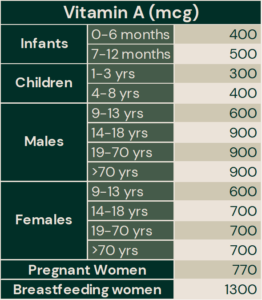
Vitamin B1 Daily Intake Recommendation
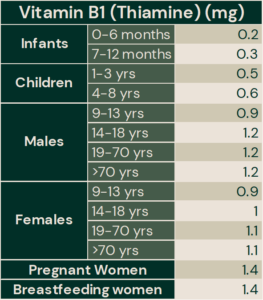
Vitamin B2 Daily Intake Recommendation
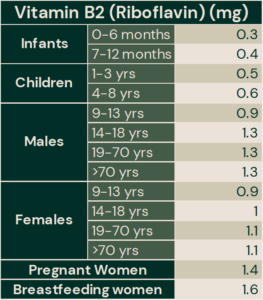
Vitamin B3 Daily Intake Recommendation
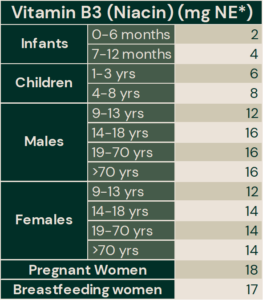
Vitamin B5 Daily Intake Recommendation
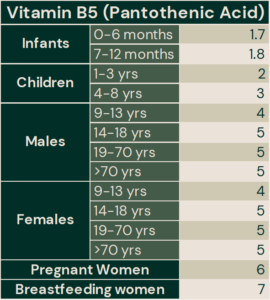
Vitamin B6 Daily Intake Recommendation
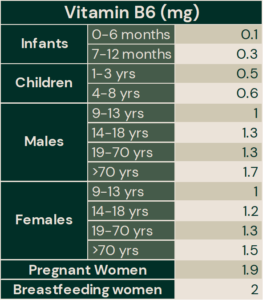
Vitamin B9 Daily Intake Recommendation
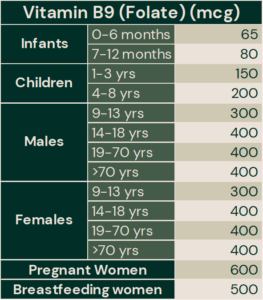
Vitamin B12 Daily Intake Recommendation
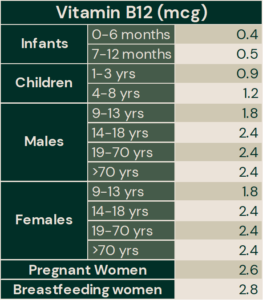
Vitamin C Daily Intake Recommendation
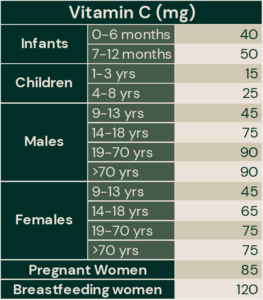
Vitamin D Daily Intake Recommendation
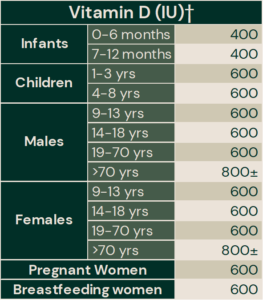
Vitamin E Daily Intake Recommendation
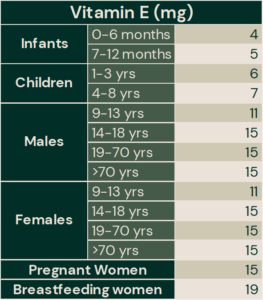
Vitamin K Daily Intake Recommendation
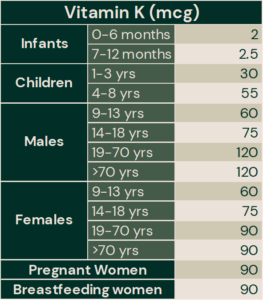
What are Minerals?
Minerals are elements that your body requires to develop and function properly. They can be split into two categories, macro minerals and trace minerals.
What are Macro minerals?
Macro minerals are needed in larger amounts and can be found in:
- Calcium
- Calcium is essential for strong bones and teeth, as well as supporting muscle function and nerve transmission.
- Sources – Dairy products, green leafy vegetables, soya beans, tofu, nuts.
- Chloride
- Helps maintain fluid balance and is a key component of stomach acid.
- Sources – Salt, seaweed, rye, tomatoes and lettuce.
- Magnesium
- Crucial for muscle and nerve function, as well as supporting bone health and regulating blood sugar and blood pressure.
- Sources – Green leafy vegetables, legumes, nuts, seeds, and whole grains.
- Phosphorus
- Phosphorus works with calcium to form bones and teeth, as well as converting food into energy and supporting cell growth and repair.
- Sources – Meat, poultry, fish, nuts, beans, and dairy products.
- Potassium
- Potassium helps in regulating fluid balance and blood pressure. It also helps with muscle contractions and nerve signalling, as well as reducing the risk of strokes and cardiovascular diseases.
- Sources – Tree fruits, leafy greens, vine fruits, root vegetables.
- Sodium
- Sodium aids in maintaining fluid balance, as well as supporting nerve function and muscle traction.
- Sources – Salt, processed foods, cheese and cured meats.
- Sulphur
- Sulphur is essential for building proteins, and aids in detoxification processes in the liver.
- Sources – Eggs, chicken, nuts and seeds.
Macro Minerals Intake Recommendations
Calcium
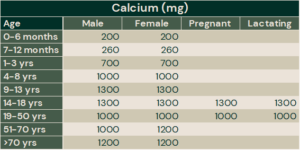
Chloride
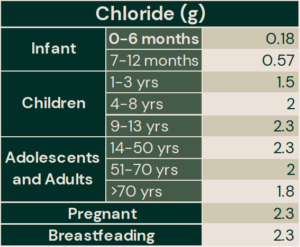
Magnesium
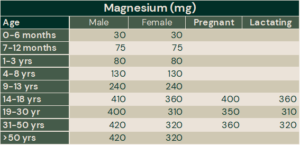
Phosphorus

Potassium
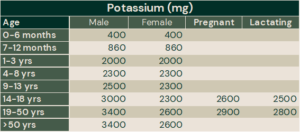
Sodium
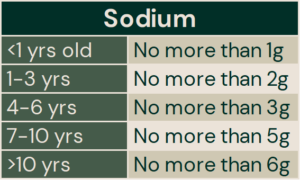
What are Trace Minerals?
Trace minerals are essential micronutrients that the human body must get from food, however, unlike macro minerals, they are only needed in smaller amounts. Trace minerals are present in:
- Chromium
- Helps regulate blood sugar by enhancing the action of insulin.
- Sources – Shellfish, vegetables (especially broccoli), whole grains and nuts.
- Copper
- Helps form red blood cells and maintain healthy nerves and immune function.
- Sources – Shellfish, grains, beans, and nuts.
- Fluoride
- Promotes dental health by preventing tooth decay and strengthening enamel.
- Rye, oats, bran, and buckwheat.
- Iodine
- Iodine is essential in producing thyroid hormones, regulating metabolism.
- Seaweed, cow’s milk, and eggs.
- Iron
- Iron is vital for the production of haemoglobin and myoglobin. It also supports energy production and immune function.
- Red meat, beans, and nuts.
- Manganese
- Supports bone health, collagen production, and wound healing.
- Whole grains, shellfish, nuts, and legumes.
- Molybdenum
- Molybdenum helps detoxify harmful sulphites and prevent toxic build-up of certain substances.
- Legumes, whole grains, and dairy products.
- Selenium
- Vital for antioxidant protection, immune support, thyroid function, heart and brain health, cancer prevention, reproductive health, and reducing inflammation.
- Seafood, meat, eggs, and nuts.
- Zinc
- Zinc supports immune system function and wound healthy, as well as skin health.
- Meat, legumes, shellfish, seeds, and nuts.
Trace Minerals Intake Recommendations
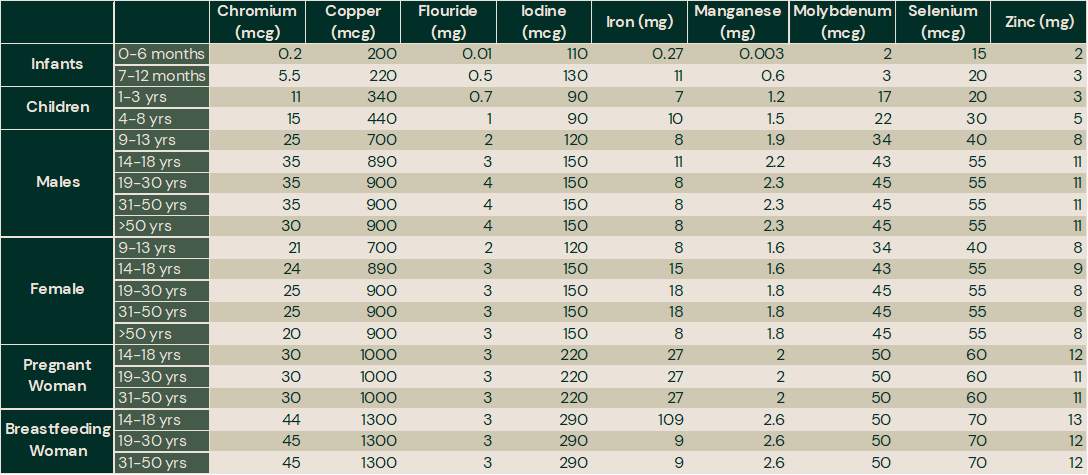
Frequently Asked Questions (FAQs)
What is the difference between macronutrients and micronutrients?
Macronutrients are nutrients required by the body in large amounts, such as carbohydrates, proteins, and fats. They provide energy and are essential for growth, metabolism, and other bodily functions. Micronutrients, on the other hand, are vitamins and minerals that are needed in smaller quantities. Despite being needed in smaller amounts, micronutrients are crucial for immune function, bone health, and disease prevention.
What are Macronutrients?
Macronutrients are the primary nutrients the body needs in larger quantities to function properly. They include carbohydrates, proteins, and fats. Each macronutrient serves a specific role: carbohydrates provide energy, proteins help with muscle repair and growth, and fats store energy and assist in absorbing certain vitamins.
What are the 7 essential micronutrients?
- Vitamin A (important for vision and immune function)
- Vitamin C (supports immune health and skin repair)
- Vitamin D (crucial for bone health)
- Calcium (supports bone structure)
- Iron (vital for oxygen transport in the blood)
- Magnesium (helps with muscle function)
- Zinc (supports immune function and wound healing)
What is the role of macro and micronutrients?
Macronutrients provide the energy and building blocks for the body’s basic functions, including growth, metabolism, and muscle repair. Micronutrients, while not providing energy, are essential for the proper functioning of many biological processes, such as enzyme function, immune health, and maintaining healthy bones.
How can you tell which vitamins you’re lacking?
Signs of vitamin deficiencies vary depending on the specific vitamin you’re lacking. For example, a lack of vitamin C can lead to fatigue, weakened immunity, or slow wound healing, while low levels of vitamin D may cause bone pain or muscle weakness. Blood tests and consulting with a healthcare provider are the best ways to confirm any deficiencies.
How does digestive health affect nutrient absorption and use?
Your digestive health plays a critical role in how well your body absorbs and uses nutrients. Poor gut health can impair the absorption of both macronutrients and micronutrients, leading to deficiencies. Factors like inflammation, stress, or imbalances in gut bacteria can negatively affect digestion and nutrient absorption.
How can you balance macro and micronutrients in your diet?
To balance macro and micronutrients, focus on eating a variety of whole, unprocessed foods. Include a mix of proteins, healthy fats, and complex carbohydrates with every meal, and ensure that you eat plenty of fruits and vegetables to get enough vitamins and minerals. A balanced diet will help you meet both macro and micronutrient needs.
Does tracking macros work?
Tracking macros, or macronutrient intake, can be effective for achieving specific health goals such as weight loss, muscle gain, or maintaining energy levels. However, it’s important to ensure that while focusing on macros, you don’t neglect micronutrients, as they are crucial for overall health.
Why are macronutrients and micronutrients important?
Macronutrients provide the energy your body needs to function and support physical activity, while micronutrients are essential for processes like immune function, bone health, and tissue repair. Both types of nutrients are vital for maintaining overall health, and a deficiency in either can lead to various health issues.
What helps your body absorb nutrients?
Certain factors can enhance or inhibit nutrient absorption. For instance, eating fat-soluble vitamins (A, D, E, K) with healthy fats can improve their absorption. Similarly, consuming vitamin C with iron-rich foods can enhance iron absorption. On the other hand, excess consumption of caffeine or alcohol can hinder nutrient absorption.
How can we help?
Lehmann Ingredients have a 35 year history in the sourcing and supply of food ingredients for customers both in and outside of the UK. We are trusted suppliers of high-quality ingredients to a number of established companies from start-ups to more established companies leading in various retail categories.
Contact a member of our team by emailing enquiries@lehmanningredients.co.uk or calling +44 (0) 1524 581560




